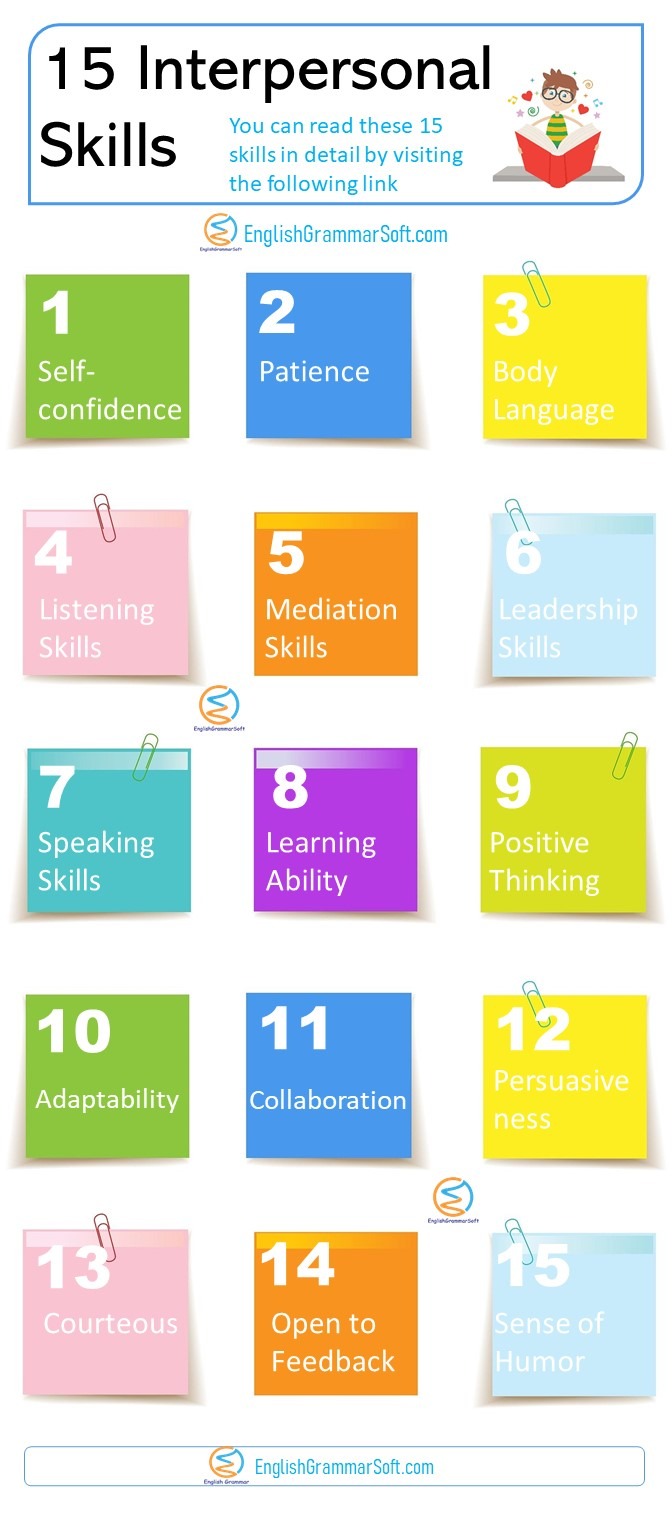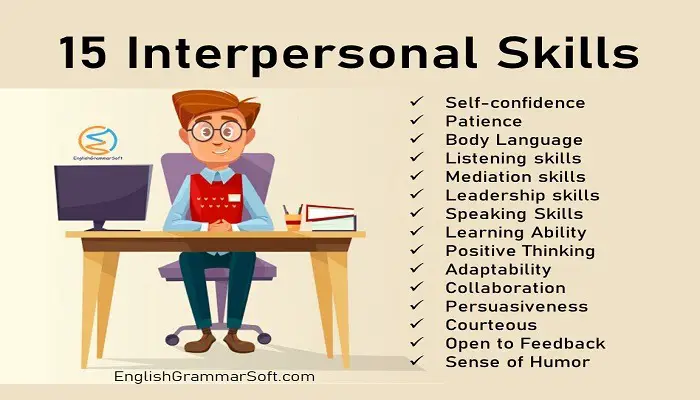What are the 15 interpersonal skills?
Interpersonal skills are a range of behaviors that help us get along with other people. these include communication skills, problem-solving skills, and social skills. here’s a list of interpersonal skills, along with ideas for improving them.
Interpersonal skills are the composite of behaviors and attitudes that one person displays to another. They involve both verbal and non-verbal behaviors and enable two people to deal with each other in a positive manner. Interpersonal skills help build harmonious relationships. They do not focus on technical knowledge or logic; they focus on communicating effectively and building rapport with others. Good interpersonal skills improve your social life and provide you the power to lead people in a successful manner.
What are the 15 interpersonal skills?
Interpersonal skills are distinguished from technical and professional skills. Interpersonal skills direct the development and use of your personality and charm. They include things like:
#1 – Self-confidence
Self-confidence is a feeling of self-worth and assurance in one’s own abilities. It is the belief that one has the ability to accomplish something and be successful in life.
Confidence can be defined as “the degree of certainty or faith in oneself”. Self-confidence is not just about being confident, it also includes believing you are worthy enough for success.
Self-confidence without competence would lead people to overrate their capabilities, while confidence with competence leads people to have realistic expectations about themselves.
According to social psychologist Amy Cuddy, “our brains rely on our feelings of confidence rather than our actual abilities” when coming up with predictions about how well we will do at tasks.
#2 – Patience
Patience is hard for many people to achieve, and it can be tough to teach. It is an important interpersonal skill.
The word “patience” comes from the Latin word “patientia,” which means “to suffer.” It’s an important virtue that not only helps us cope with difficult situations but also makes us better people overall.
The key to understanding patience is understanding its meaning. Patience can be defined as “the ability or willingness to accept or tolerate something unpleasant.”
It’s not about being happy with the situation, instead, it’s about waiting for things to improve without becoming frustrated and angry.
If you have patience, you can get the beneit of improved mood, higher self-esteem, less distress and anxiety among others. There are even more reasons that the patience may benefit you such as your relationships with others improving because you’re able to give them time rather than demanding an immediate action.
#3 – Body Language
“Body language is the nonverbal communication that can be used to express emotion. Being able to recognize body language, therefore, is an important skill for communicating with others.”
Body language is a powerful form of nonverbal communication that conveys messages, feelings and emotions without words. It can be used to understand the thoughts, feelings and intentions of other people.
It is also an important part of interpersonal relationships because it facilitates understanding between people by revealing someone’s attitudes or level of interest in another person.
#4 – Listening skills
Listening skill is an important life skill that all people should practice. Listening skills are vital to both our personal and professional lives, but it can be difficult for some to develop these skills if they have never been taught how.
Listening is not just about hearing something loud enough; it’s also about understanding what one hears. Hearing something means that there have been sound waves produced by another person.
Listening is a skill that not many people master. It can be difficult to listen because it requires active participation and focus. The best way to improve your listening skills is by practicing, which means listening more often and with a purpose.
The first step in becoming an effective listener is to know the difference between hearing and listening — hearing just takes place passively whereas listening requires engagement from both parties involved in the conversation.
Once you have mastered the basics of being a good listener, there are other things you should take into consideration such as focusing on certain aspects of what the other person says or even making sure that they feel comfortable.
#5 – Mediation skills
Mediation is a process that can help people come to a resolution without going through the trouble and expense of a court case.
This skill is required where two parties work together to reach an agreement. Mediation is usually done with the help of a mediator, who guides both sides through the negotiation process.
The mediator can be someone with legal knowledge or just someone good at conflict resolution.
The benefits of mediation are many – it’s cheaper than going to court, there are no long waiting periods before results are achieved, and people have more control over their own outcome because they’re not relying on judges or juries to decide for them.
Mediation also gives you time to think about your options without being pressured by deadlines imposed by others.
#6 – Leadership skills
Leadership skills are the abilities and qualities that someone needs to be a successful leader. These can include things like charisma, good planning and decision-making skills, and the ability to motivate people.
Most people would say that there is no such thing as one single leadership skill – it’s more of an accumulation of these traits that make up what we think of as “leadership.”
It means many different things to many different people. However, the person who possesses these skills and uses them wisely can be successful in any field of life.
#7 – Speaking Skills
Have you ever been in a situation where you’re having an important conversation with someone and they just don’t seem to be listening to what you’re saying?
There’s nothing more frustrating than trying to talk over the noise of an airplane engine or struggling to be heard above a group of people excitedly talking.
It can feel like your voice is not worth much at all, because no one seems interested in hearing it.
But this doesn’t have to be the case! In fact, great speaking skills are essential for success in many different areas of life, from home relationships and friendships, school settings, work environments- even social media.
We all need good communication abilities as we navigate through our daily lives. If you want your words to really matter and make an impact, you should possess good speaking skills.
It’s important to have good speaking skills for any job or career. You can be an amazing worker but if you are not able to speak clearly, it will make your work difficult and ineffective.
Speaking skill also needs practice in order to perfect it. Achieving the right tone while speaking is also something that takes time and effort. It’s important that you find someone who has mastered these things so they can help you improve yours!
#8 – Learning Ability
Having the ability to learn is essential for success in today’s society. Learning ability, or intelligence as it is often called, encompasses many different skills that are needed to be successful.
Learning ability is a term that refers to the capacity of an individual to acquire and retain knowledge.
The term has evolved over time, originally referring only to verbal skills in adults, but now includes many different types of abilities. Learning ability can be thought of as the result of two factors: intelligence (IQ) and effort.
A person with a lower IQ will need more effort than someone with a higher IQ in order to learn at the same level.
Intelligence (IQ) is measured by performance on tests measuring reasoning skills or problem-solving abilities; it’s not always possible for teachers or parents to measure learning ability without these kinds of assessments because there are some children who may not show their intellectual potential until they’re challenged academically.
Learning abilities matter because they determine what you can achieve academically and professionally. They shape your life chances.
#9 – Positive Thinking
Positive thinking is an approach to life that many people believe can give you a happier and more fulfilling experience. Positive thinking also refers to the process of seeking out the good things in life rather than dwelling on negative experiences or bad luck.
There are several ways to think positively, but there are two main types of positive thinkers: those who use optimism as their primary strategy and those who use gratitude as their primary strategy.
Both strategies have been found to be effective in helping people lead healthier lives with reduced levels of stress and increased levels of happiness.
Positive thinking has also been shown to improve relationships, make work more enjoyable, and help lower the risk for depression.
It is the idea that by focusing on thoughts which are optimistic and hopeful, a person can create an environment in their own mind that will be more conducive to achieving goals.
It has been suggested that if one’s outlook on life is generally positive, they will have increased levels of happiness and well-being.
#10 – Adaptability
Adaptability is the ability to adjust or change behavior in order to respond effectively to a changing environment. The word “adapt” comes from Latin roots meaning “to make fit.”
However, it can also be interpreted as “fitting oneself into one’s surroundings.” This is the way many people perceive flexibility.
Adaptability could mean adapting your business model to meet consumer needs, or taking on new challenges like learning a new language.
It could even mean adopting different ways of thinking about an issue you care about because society has changed its values over time.
Adapting your business model due to changes in technology and market demands – trying out something different that will help you grow – learning another language or skill set.
It also refers to the ability of a person, group, or company to cope with adversity and changing conditions.
It’s important for all organizations as they grow and evolve. When we build an organization that can be flexible as it faces challenges, everyone wins: customers are happier because their needs are met; employees feel more fulfilled; investors see better returns; communities thrive when businesses contribute positively.
#11 – Collaboration
Collaboration means that two or more people work together in order to accomplish something that they couldn’t do alone. One person may contribute their thoughts while another contributes their skillset in order to reach a common goal, which can lead to success.
It also refers to the process of creating or developing an idea by discussion and sharing thoughts, feelings, and insights.
Collaboration may seem like an easy concept, but it’s actually much more complex than just getting people in one room at one time.
The way people interact during collaborative work will determine how well they collaborate on future projects.
#12 – Persuasiveness
Another great interpersonal skill!
Persuasiveness is defined as the capacity to be or have an effect on someone’s opinion or behavior. It is often seen in advertising with catchy slogans and persuasive messages.
Persuasion can happen through a variety of channels including words, symbols, images, and sounds. More importantly, persuading others requires understanding their needs and goals as well as having credibility within that group.
It is the degree to which a person’s attitudes or behavior can be changed through persuasion. Persuasion is an intentional act that aims to change someone’s attitude or behavior towards something, typically by providing information and facts that support the desired outcome.
The persuader must be credible and capable of understanding their audience in order for this process to work effectively.
There are many different types of persuasive messages, such as motivational speeches, advertisements, writing, warnings and instructions.
Each type has its own unique way of influencing people and it all depends on what you want them to do: buy your product; vote for you; stop smoking; etc.
The goal of persuasion is not always clear because there are many different approaches used depending on the situation.
#13 – Courteous
Courteous is a word that means polite, respectful, and thoughtful. It’s important to be courteous in all aspects of life because it shows the world how you want to be treated.
Being courteous can make someone’s day better or worse; for example, if you are waiting on line at the grocery store and someone lets you go ahead of them then that person was courteously letting you pass first.
One word that can be seen as the opposite of courteous is impolite. There are many examples where people can become impolite. One example would be when someone pushes in front of you and doesn’t apologize, or if someone cuts you off on a road and does not let you go first.
These types of actions make others feel frustrated because they could have been courteously waited their turn or allow another car to merge onto the highway.
#14 – Open to Feedback
We get it — feedback is hard. It’s uncomfortable to be on the receiving end of someone else’s thoughts, criticism, and suggestions.
But, to be open to feedback is a skill which not only develops patience but also improves your chances of success, if you take it positively.
Feedback can come in many forms: praise, constructive criticism, or even just asking for clarification.
Feedback from managers can be helpful for an employee’s personal growth as well as their understanding of company expectations.
Receiving constructive criticism also gives employees a chance to grow personally, because it forces them out of their comfort zone and into unfamiliar territory where they may succeed or fail – but at least they’ll have tried something new!
#15 – Sense of Humour
A sense of humor is an individual’s ability to laugh and enjoy themselves in spite of their situation.
In order for someone to have a good sense of humor, they need to be able to find something humorous no matter what happens.
You may be wondering what a sense of humor has to do with your physical health. Humor is an integral part of a healthy lifestyle, and can help reduce stress levels and promote emotional well-being.
So, if you have the ability to create humor, you can easily get out of the difficult or tense situation by utilizing this skillset.
Final words
Lack of good interpersonal skills can have a negative impact on your quality of life because it affects how others perceive you.
For example, if someone does not have good social skills they may come across as distant or unapproachable which could lead them to being left out of meetings and discussions where valuable information is shared.
Interpersonal skills are also important for managing conflict at any stage of your life; without these abilities it’s more likely there will be tensions. The quality of our lives can be greatly affected by how well we interact and communicate with others. That is why so much emphasis is placed on teaching interpersonal skills.
Successful people have strong work ethic, but their interpersonal skills set them apart from others who lack these qualities.
Frequently Asked Questions
What is the most powerful communication?
The most powerful form of communication is the one that captures your audience’s attention and makes them want to listen to you.
If you go back to the basics, the most powerful forms of communication are:
-> Speech
-> Writing
-> Visualization
The human brain processes visual information 60,000 times faster than text. The more visuals you use in your presentation, the more effective it will be.
How do you develop good interpersonal working relationships?
Developing a good interpersonal working relationship is critical to the success of your business. A good working relationship can help you build a better business, while a bad one can be detrimental to your growth and success.
Here are some tips on how to develop a positive working relationship with your employees:
Be approachable – Make sure that your staff knows that they can approach you with any issues or questions they have. If they feel like they can’t talk to you about their problems without fear of being fired or reprimanded, you will lose their trust and respect, which will make it more difficult for them to work well with you.
Be honest – Honesty is the best policy when it comes to dealing with employees. If there’s something wrong with their work performance, tell them directly instead of waiting until they’re due for a review or promotion before letting them know what needs improvement.
Don’t micromanage – Try not to get too involved in your staff’s daily tasks unless absolutely necessary; this will only cause more stress for both parties involved and cause more problems than it solves. Let them handle their day-to-day responsibilities without interference from you as much as possible so that they can get their jobs done without having to worry about pleasing anyone else besides themselves.

Further Reading
- Interpersonal Skills in Communication
- 29 Simple Tips to Improve Interpersonal Skills
- Some good examples of interpersonal skills
- 4 Types of Reading Skills and Strategies to Enhance Reading Speed
- Interview Skills
- What are Writing Skills?
- Activities for listening skills
- Speaking Skills in Communication (Definition, 5 Barriers & 7 Tips for Improvement)
- 5 Common Writing Mistakes to Avoid
- 12 Writing Tips for Beginners | Tips to help keep readers interested in your writing
- How to Improve Your Writing Vocabulary in 5 Effective Ways






